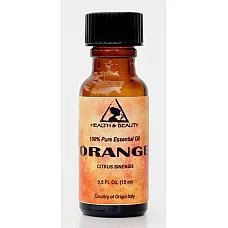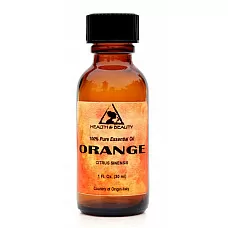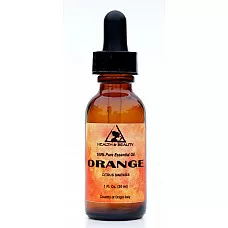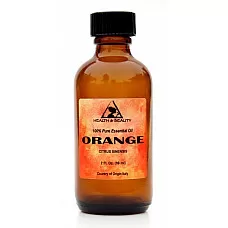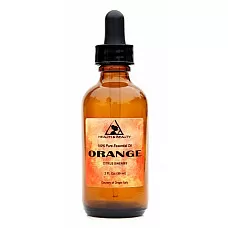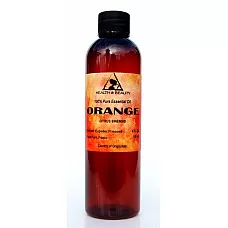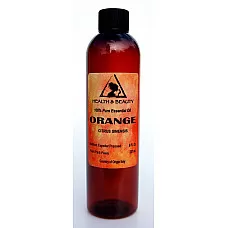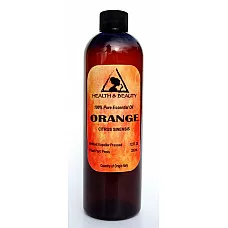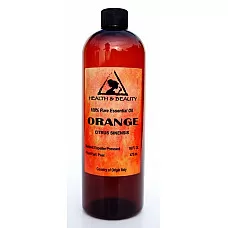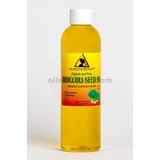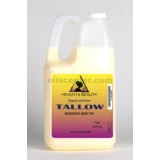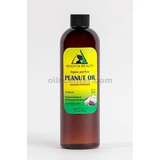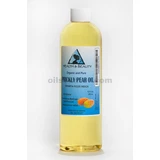$0.00
Checkout
Sweetish, light, slightly tart and such a sunny scent of orange peel fills one of the main cosmetic oils - orange with delightfully summer notes. A bright fruity aroma that always evokes a festive mood is not the only advantage of this essential oil. Due to the availability of the starting material and the relatively simple production process, it belongs to the group of the most affordable aromatic oils.
Characteristics of orange essential oil
Orange oil is obtained by hydrodistillation or cold pressing from the peel of citrus fruits (leaves and flowers are used to obtain other oils - petitgrain and neroli). The best are oils of Guinean or Spanish origin, products obtained in America or Brazil are less valued, where the production of orange aroma oil is often combined with the production of orange juice.
Outwardly, this essential oil is a fairly fluid liquid, which always leaves yellow-orange traces on clothes or a napkin: dyes and pigments contained in the peel of oranges, during distillation, get into the oil.
Almost all orange essential oils contain special antioxidant components: this is one of the most rapidly oxidizing oils and needs additional additives for long-term storage.
Among orange essential oils, it is customary to distinguish between two subspecies - sweet and bitter orange oils, which differ not only in composition, but also in smell: bitter orange oil has a more refined, refined aroma.
Orange aroma oil combines well and mixes well with the majority of essential oils. All citrus and coniferous oils, as well as essential oils of geranium, rose, ylang-ylang, juniper, jasmine, cinnamon, savory, nioli, frankincense, nutmeg, chamomile, oregano and sage, coriander and cloves are considered complementary aromas for orange oil. The ideal partner for orange oil is lavender essential oil, which accentuates and complements its soothing effect.
The use of orange oil is based on its anti-inflammatory, soothing, tonic, regenerating, immunostimulating, antiseptic, relaxing properties.
Use in cosmetology
Orange aroma oil is most widely used in the field of cosmetology, showing itself as an excellent regenerating agent for all skin types. Cosmetic creams and emulsions enriched with orange oil help to restore skin elasticity and reduce wrinkles, are used as a vitaminizing, whitening, protective agent.
This oil is perfect for problem skin too: it will help to cope with enlarged pores and acne scars.
As part of hair cosmetics, this essential oil helps fight dandruff and excessive dryness.
Contraindications and dosages
Before using orange essential oil, be sure to perform a sensitivity test by applying a drop of oil to the delicate skin behind the ear or on the bend of the elbow for several hours.
This essential oil belongs to the group of phototoxic substances, therefore it should be applied with caution to the skin on sunny days. This oil should be carefully applied to pregnant women, as well as to everyone who suffers from epilepsy, citrus allergies, hypotension, and gallstone disease.
- A standard dosage for improving the quality of cosmetics - creams, tonics, milk, lotions - 5 drops of essential oil for every 15 grams of cosmetic base. The resulting formulations are best used for normal, sensitive or dry skin, while for oily skin, it is better to prepare a mixture of orange oil with nioli and juniper (2: 1: 1).
- The same dosage - 5 drops of aromatic oil - is also used for taking delightfully relaxing and rejuvenating aromatic baths (after dissolving the essential oil in honey or milk).
- For aromatherapy massage 2-3 drops of orange oil are mixed with vegetable oil or a special relaxing massage cream.
-
👍 New items in Orange Essential Oil 2026
-
💯 Bestsellers in the Orange Essential Oil 2026
-
💵 Cheapest Orange Essential Oil 2026
-
💰 Most expensive Orange Essential Oil 2026
-
✅ Most popular products in the Orange Essential Oil 2026
-
💵 Price range: from to Orange Essential Oil 2026
-
What is the aroma profile of Orange Essential Oil?
-
Can Orange Essential Oil be applied directly to the skin?
-
What are the potential benefits of using Orange Essential Oil in aromatherapy?
-
Is Orange Essential Oil safe for use during pregnancy?
-
Can Orange Essential Oil be used in cooking?

